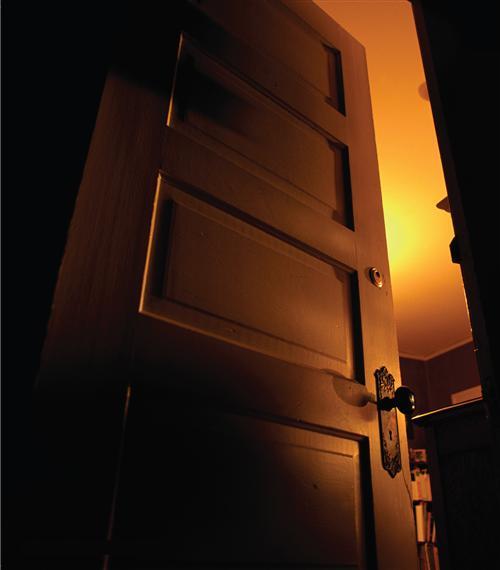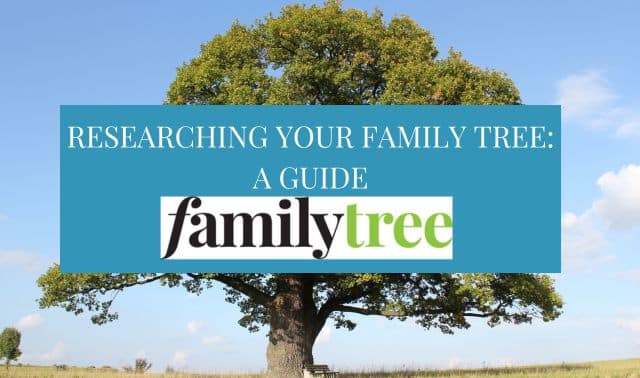
Perhaps you, too, have a bad businessman in your family tree — or a “premature” baby, a scandalous romance or a flat-out scoundrel. “If you haven’t found something embarrassing, you just haven’t looked hard enough,” Boeman says. Even though scandals can make your clan’s history a real page-turner, longstanding secrets have the potential to ruffle feathers even decades after the fact.
Like any good researcher, you want to get into that closet and dig up the dusty stories, but how do you find out the truth? Here, several genealogical ghost busters share their experiences to help you research, reveal and reconcile with the skeletons in your family closet.
1. Ask relatives.
“What makes family history interesting is when people get themselves in trouble,” says Nancy Ellen Carlberg, longtime genealogist and author of Family Secrets and Scandals (Creative Continuum). Begin collecting old gossip by (carefully) questioning family members. “You may have to explain gently to some of your relatives that the story won’t be a scandal in a few generations,” says Carlberg. “Sometimes people won’t come out and tell you the full story, but they might write it down.”
Building relationships with living relatives is an important step toward discovering more about your family’s past. One woman spent the first three years of her marriage attending her husband’s family reunions, getting to know his relatives and collecting oral histories, even creating a two-volume scrapbook of her husband’s childhood. Later, her husband’s grandmother bequeathed her a large box of family photos with the simple explanation, “I know you’ll take care of these right.”
Even where trusting relationships exist, it may take patience and repeated (but tactful) inquiries to learn interesting family stories. You may get bits and pieces at different times, and from different people. Taking notes on who said what will help you keep their stories straight. Preparing a list of questions to ask will make your next conversation with Aunt Chatty much more productive.
If your relatives are still tight-lipped after patient pestering, look for more interviewing tips in the March 2008 Family Tree Magazine. Persistence pays off, as Tim Richards learned. “When my first child was born, I asked my mother about my father’s family,” Richards says. His mother balked at first, then revealed that Richards had a half-sister. A cousin disclosed that Richards also had a half-brother. Richards never would’ve known any of them if he hadn’t started asking questions.
2. Dig up the dirt.
Of course, you can’t take all family legends at face value, since facts often get distorted as stories are passed along. “Look for as many official sources as possible,” Carlberg says. “Then you can back up your stories.” Documenting your research is always in a family historian’s best interest, but it’s particularly important when relatives might question a story. Truth is always the best defense.
So how do you fact-check family legends? Get back to basics and look for all the records pertaining to your family. Birth, baptism and death records; censuses; marriage and divorce data; court records; wills; and even draft registrations can yield great stories. The little pieces of data the records contain — such as names, dates and places — can help you confirm or debunk a story.
For example, one family’s 1800s census records revealed the oldest son was a deaf-mute who never married or left his parents’ household. Originally, the boy was named Charles, after his father. But years later, he was renamed Hunter when the parents had a more able-bodied son and gave him Charles’ name. In another instance, census, marriage, birth and divorce records told the tale of a young West Virginia couple who married young, immediately had two daughters, divorced upon the birth of the second, and remarried other people within a year. Talk about family drama.
Newsworthy bits also can show up in newspaper articles, scrapbooks, letters and even old store ledgers. A 1930s newspaper article gave Nancy Loomis new insight into her family’s financial history. Loomis, whose clan hails from New York, grew up knowing her Uncle Norman had cut her father out of the billion-dollar family business. (Names have been changed to protect the innocent.) But she hadn’t fully appreciated the extent of Uncle Norman’s greed.
“According to this article, Uncle Norman tried to discredit the wife of his brother, my Uncle Ed, so Norman could claim her husband’s financial interests in the company,” says Loomis. (Uncle Norman had already committed Uncle Ed to a sanitarium.) “While my aunt was vacationing in Monte Carlo, Norman hired someone to drug her, get her to a hotel room and pose as her paramour. At a compromising moment, photographers rushed into the hotel room and snapped pictures of her.”
Loomis dug further, finding a published history of the family’s company, which Norman ran for 56 years. The book chronicled how Norman swindled his family, including Loomis’ father. “When Uncle Norman was first declared president of the company, he had 100 shares of stock,” Loomis says. By the time he died, he had 41,758 shares — a large portion of which came from his own relatives.
3. Search out the bigger picture.
Scandals don’t occur in a vacuum. Every story has a history, and the personalities involved and cultural values in play affect choices and outcomes. It’s up to a genealogist to research historical records to uncover this kind of background information.
Ed Hill used several sources to make sense of his third-great-grandfather’s 1808 capital murder trial in Caroline County, Va. He started with court records, then added bits from several family histories, interviews with descendants of the man Samuel Hill had murdered, and his knowledge of US history.
Samuel Hill was prominent and wealthy — but according to court records, had a hot temper. “He killed a man with whom he’d had a long-standing feud,” says Ed Hill, who contacted the murdered man’s descendants to see what else he could learn. It turned out the guy Hill’s ancestor had shot had a temper, too — his wife sued him for divorce because of cruelty. “The descendant of the victim I interviewed said it sounded like his ancestor got what he deserved,” he says.
But Hill wondered whether there might have been more behind the jury’s decision to condemn Samuel Hill. Samuel was described as “very British” in a family history, and he died just before the War of 1812, so anti-British sentiment might have been a factor in the trial.
Hill’s many sources helped him put his ancestor’s murderous act into a larger context. “The more you know about your family’s historical background, the better off you are,” Carlberg says. “What constitutes a scandal varies from culture to culture and from time period to time period.”
For example, did an ancestor’s community have a local preacher, or did a traveling minister visit their town every few years to marry those who’d moved in together? The answer might explain birth dates that appear on the “wrong” side of marriage dates — without any scandal whatsoever. Not sure where to find information on social mores? Start with a book such as Katherine Scott Sturdevant’s Bringing Your Family History to Life Through Social History (Betterway Books).
4. Come to terms with the past.
You might’ve heard the joke about the researcher whose ancestor was hanged as a horse thief. In her family history, the embarrassed genealogist wrote her forebear died “during an important civic function held in his honor, when the platform on which he was standing suddenly collapsed.”
If you’re feeling uncomfortable with your family’s past, Carlberg stresses the importance of letting the facts speak for themselves. “When you find [scandals] in the branches of your family tree, you must remember that you cannot change the past,” she writes in Family Secrets and Scandals. “A good reporter leaves personal bias out and just reports the facts.”
Chris Boeman agrees. “Where you come from doesn’t determine where you’re going to end up, or where your children are going to end up.” He balances the bad ancestral apples with the good ones. “There’s something noble and edifying in everyone’s family history, too.”
But family secrets can be jarring — even scarring — when they’re more recent. Both Loomis and Richards discovered truths about people they’d known, and those truths affected their own lives.
“As a child, you hear little bits of things and you don’t know how to put it together,” Loomis says. “I was really angry about Uncle Norman. When he died, he could have chosen to bequeath shares of the family company to my father. He left him nothing. He left his shares to his business cronies, most of whom are now multimillionaires.”
Richards, who found half-siblings as an adult, is grateful to have new family to claim. It wasn’t easy to learn that his dad left three families fatherless, and it was sad that he hadn’t known his brother and sister for years. But finding those kin “gave me a sense of belonging, a place in history,” Richards says. His dad was just the black sheep of his family, he says — a hiccup in an otherwise honorable family history.
Carlberg believes that difficult family stories can help people face the future more optimistically. “Most of the time when you read family histories, you think everyone there must be perfect. I think it’s good to know the family wasn’t perfect. Everyone’s had problems in the past.”
5. Share stories sensitively.
Just because you’ve come to terms with ancestral gossip doesn’t mean your relatives will welcome its return.
Ed Hill gave his father’s cousin the full story about her great-great-grandfather Samuel Hill’s alleged character, murderous act and shameful end. She listened carefully and said, “Ed, I think you’ve researched just a little too much.”
Before broadcasting a particularly juicy tale in a book, Carlberg suggests, “think about what effect your story will have. Ask the people involved privately before you put something in print.” It’s customary not to publish any genealogical information about living people, but you also might want to get the blessing of the descendants of people involved in a scandal.
Even if a secret isn’t ready to be told, keep it in your files, Carlberg says — but be careful where you save your data. “Once, a woman came rushing in to the Family History Library to try to get her information back out of PAF [Personal Ancestral File, the Church of Jesus Christ of Latter-day Saints’ free genealogy software]. She didn’t realize that people would be able to see her notes, and they contained confidential information.” Of course, after the woman had submitted her PAF file to the library, it was too late — her private notes were public. The same is true for family Web sites and other electronic forms of data sharing. Once your information is on the Internet, you lose control over who sees it or where it ends up.




